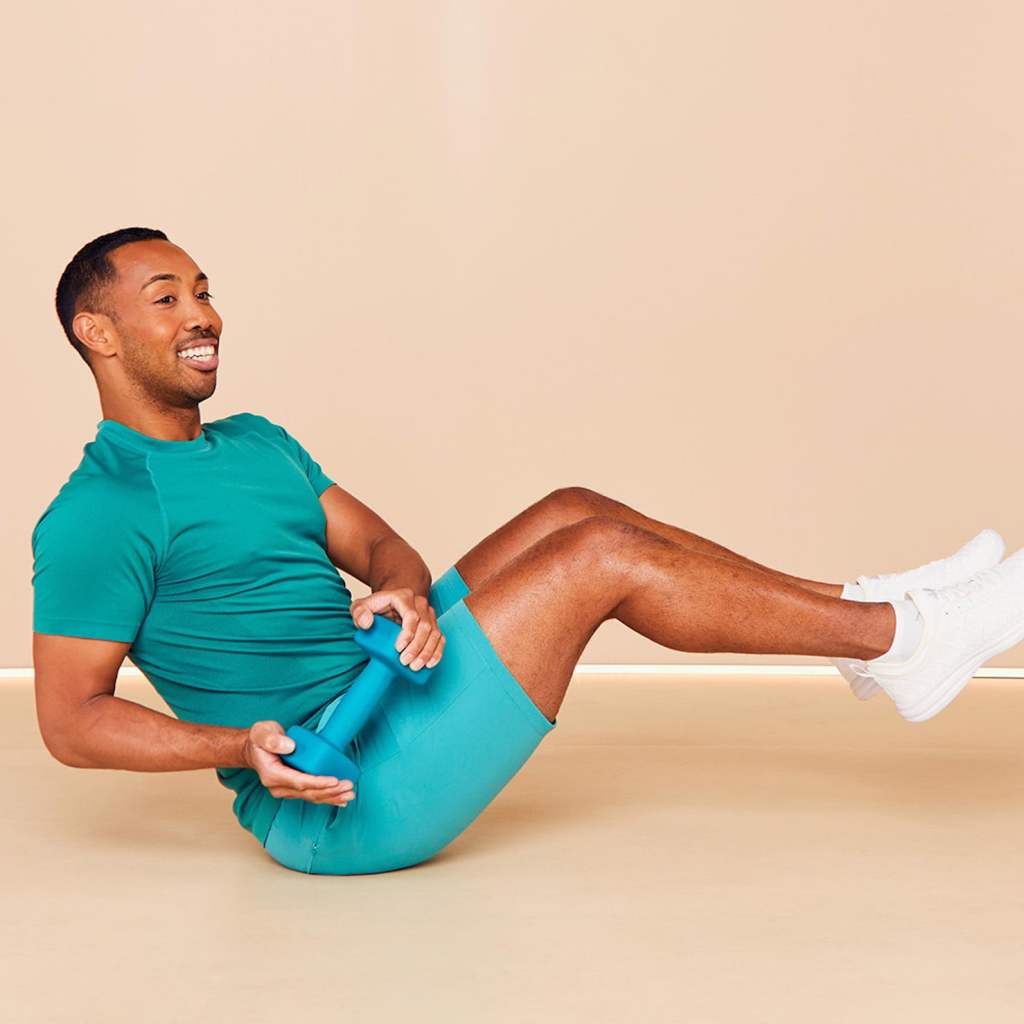We have a bit of a love-hate relationship with Russian twists. We love what they do for our abs, but man, do they burn. While no one ab exercise can give you an instant six-pack, learning how to do a Russian twist can put you on the right path, while building strength, improving stability, balance, and mobility, per the American Sports and Fitness Association (ASFA). To make sure you’re getting the most out of the exercise, we spoke to a trainer about how to do Russian twists properly – with and without dumbbells – and why our abs can’t seem to get enough of them.
Even if Russian twists are already a part of your routine, there’s still a chance you could improve your form for better results and optimal burn. Although the twist is a fairly beginner-friendly ab exercise, Rachel Norman, a NASM-certified personal trainer, says there are still some common mistakes to look out for. For starters, make sure you’re relying on the strength of your abs to twist from side to side – not momentum. “Avoid swinging the arms and instead use slow, controlled movements with emphasis on engaging the core,” Norman says. Keep your back straight to protect your spine, and try not to overdo it on the twist. “Always aim for a comfortable range of motion.”
The hard work is worth it when you consider all the benefits of Russian twists. When done correctly, Russian twists strengthen several muscles in your core and back, helping with posture and potential back pain. Rotational exercises like Russian twists can also lead to better mobility and coordination, engaging the transversus abdominis (deep core) for better balance. Read on to learn more about the benefits of Russian twists, plus weighted variations for an additional challenge.
Related: Strengthen Every Muscle in Your Core With These 12 Trainer-Approved Moves
POPSUGAR Photography | Chaunté Vaughn
How to Do a Russian Twist
You don’t need any equipment to learn how to do a Russian twist. Follow Norman’s tips from the comfort of your home, or add this into your next ab workout at the gym.
- Sit with your knees bent and your feet away from your butt. Norman recommends starting either with your feet completely flat on the ground, or elevated a few inches off the floor.
- Clasp your hands together (as pictured) and, without using momentum, start to twist, making sure to engage your core. “The movement needs to be controlled; with smooth and deliberate rotation from side to side,” Norman says, encouraging you to think about your breathing. “Exhale as you twist to the side, inhale as you return to the center.” After rotating across both sides and returning to center, you’ve completed one rep.
- Do 16 full rotations to complete a set.
Russian Twist Benefits
In addition to increasing core and back strength, Russian twists have plenty of functional benefits. They can reduce back pain and improve posture, balance, and even rotational mobility. “They’re also versatile, low impact, and home- or gym-friendly,” Norman points out. Add Russian twists to your workout and see the difference yourself.
What Muscles Do Russian Twists Work?
“Russian twist works in conjunction with the muscles of your lower back and hips to enable you to rotate your body with more power,” Norman says. The rectus abdominis is primarily strengthened by Russian twists, engaging the lumbar spine so your body can twist. Lower back muscles called the erector spinae help you stabilize, while the transversus abdominis (AKA the deep core) keeps you balanced. The internal and external obliques are also heavily involved, working with your back muscles to help you rotate.
POPSUGAR Photography | Chaunté Vaughn
How to Do a Russian Twist With Dumbbells
If you’re looking to kick your ab workout up a notch, weighted Russian twists are the way to go. Using the same basic Russian twist form, Norman explains how to add dumbbells into the mix.
- Choose an appropriately challenging weight. (Refer to our guide for choosing the right weight if you aren’t sure where to start.)
- Hold the dumbbell with both hands close to your chest.
- Tighten your abs to engage your muscles, exhale, and rotate your torso to one side, then inhale as you return to the center. Norman says to keep your elbows bent and try to touch the floor with the dumbbell when you rotate, but don’t go beyond your range of motion. “Don’t work through pain; stop and reassess your form.” If you’re intermediate or advanced in your training, you can do weighted Russian twists three times a week, but be mindful of your body and allow adequate recovery time to prevent injury.
- After rotating across both sides, you’ve completed one rep. The International Sports Science Association (ISSA) recommends 10 full rotations to complete a set.

